#OscarsSoStraight – Ready for the straight, white male Oscars?
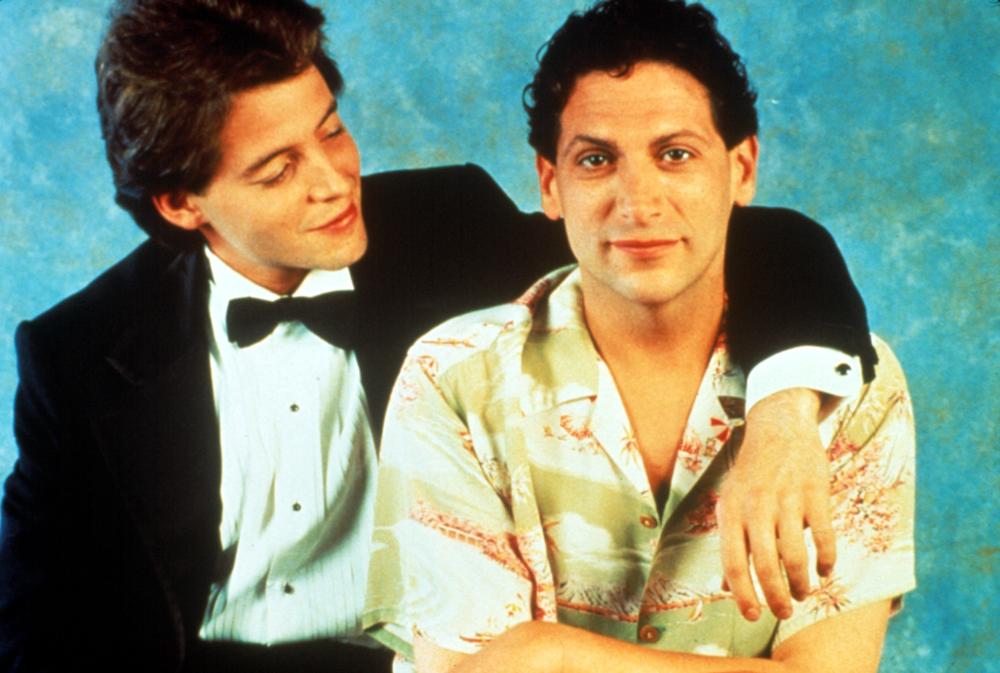
Oscar night is approaching and once again it’s been preceded by complaints – this year that no black actors have been nominated. Fair enough. But it would be just as fair to say that the Academy of Motion Picture Arts and Sciences, which awards the gold statuettes, is prejudiced against LGBT artists and films with gay themes.
This year Cheryl Boone Isaacs, president of the Academy of Motion Picture Arts and Sciences, which has awarded the Oscars since 1929, declared herself “heartbroken and frustrated” that for the second year running no black actors had received nominations. Immediately actress Jada Pinkett Smith wondered, “Should people of colour refrain from participating all together?” while director Spike Lee called for a boycott of this year’s Oscar bash. Actress Whoopi Goldberg responded, “Boycotting doesn’t work and it’s also a slap in the face to [presenter] Chris Rock.” Then actress Charlotte Rampling expressed her belief that the diversity row was “racist to white people.” Rampling later claimed that her words had been misinterpreted. But by that time Oscar night was once again a front-page hot topic.
I say “once again” because there’s nothing new about the claim that the Academy is prejudiced against minorities. As long ago as 1958 it was the reason Marlon Brando threatened to spurn his Best Actor award for Sayonara. He didn’t have to because he didn’t win. But when he did win, in 1973 for The Godfather, he famously sent “Sacheen Littlefeather” (not her real name) to reject his Oscar because of “the treatment of American Indians today by the film industry.” Black groups have picketed Oscar night since 1962, when the Hollywood Race Relations Bureau held up placards reading “Film Equality for Negroes” and “All Negroes Want a Break.”
In 1970 there were protests against nominations for the Westerns The Wild Bunch and Butch Cassidy and the Sundance Kid because the films were alleged to portray Latinos as “inferior, incompetent, worthless and ignorant.” The first political statement made during the so-called Oscarcast came in 1975 when actress Shirley Maclaine stated, “An interesting thing happened in films last year. Not many of us women were in any.” In 1984 the Academy’s attitude to women was again attacked, this time by fans of Barbra Streisand, who co-produced, directed, co-wrote and starred in Yentl and wasn’t nominated for anything. One placard on Oscar night read, “Best director nominations. Men 273. Women 1.” It was to be another 25 years before Kathryn Bigelow became the first woman to win a Best Director Oscar for The Hurt Locker.
You may not recall an LGBT protest on Oscar night. But it happened and in time-honoured tradition it was covered up. In 1992 Queer Nation planned to demonstrate against the seven nominations given to The Silence of the Lambs. One of the villains of this piece was an apparently transgender serial killer. But police in riot gear cleared hundreds of protesters from the street long before the show began.
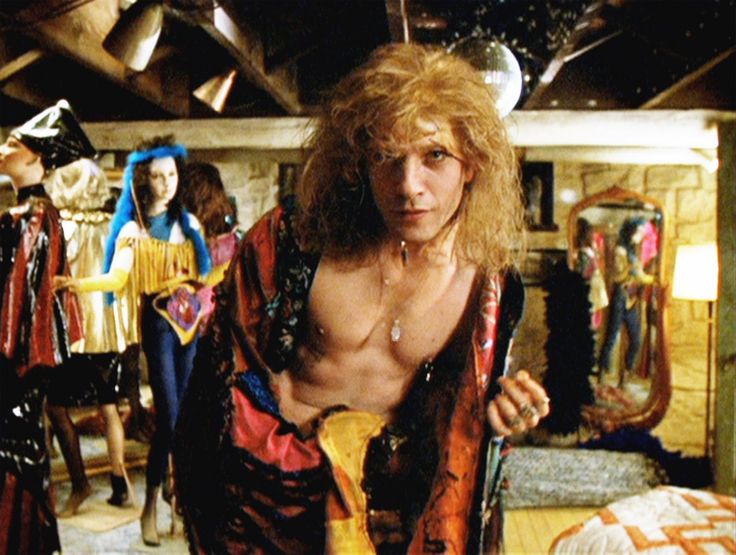
The Silence of the Lambs (1992)
How do these accusations of prejudice stack up against the Academy’s track record? Since it was founded in 1927 the Academy of Motion Picture Arts and Sciences has been an ultra conservative organisation, a fair representation, it could be said, of mainstream Hollywood itself. Despite Cheryl Boone Isaacs’ claim that the Academy has been trying to introduce diversity since the 1960s, the membership records tell a different story. A 2012 investigation found that 94% of the Academy was white, 77% was male and the median age was 62. During the Academy’s formative years films could not be nominated unless they had been shot in the USA and until 1958 no Communist could be nominated.
But perhaps the most surprising statistic is that no openly gay person has ever won a major Oscar. The Academy’s relationship to the gay community is of particular interest because we really are a special case. Whereas it could be argued that Academy voters chose to ignore other minorities, it was forced to ignore us. For the first forty years of the Academy’s existence we were illegal and Hollywood’s notorious Production Code forbade any representation of homosexuality on screen.
Anyone who has been on a film set probably will confirm that camera and sound crews, carpenters and electricians tend to be heterosexual. But when it comes to the creative side of the industry it’s another matter. Nowadays film historians delight in pointing out the gay content that writers, directors and actors managed to slip past the censors when the Talkies were young. In 1931 Morocco and Little Caesar were both nominated for Oscars. But look what happens in the films. In Morocco Marlene Dietrich, dressed as a man, kisses a woman on the lips. The entire plot of Little Caesar hinges on Edward G. Robinson’s unrequited love for Douglas Fairbanks Jnr.
As the Production Code tightened its grip on Hollywood, homosexuality all but disappeared from the screen. Crossfire, which gained five nominations in 1947, may have been based on a novel about the murder of a gay man, but in the film the victim became a Jew. In Cat on a Hot Tin Roof, nominated for six Oscars in 1958, we’re given to believe at the final fade-out that Paul Newman has been cured of the love that dares not speak its name throughout the movie.
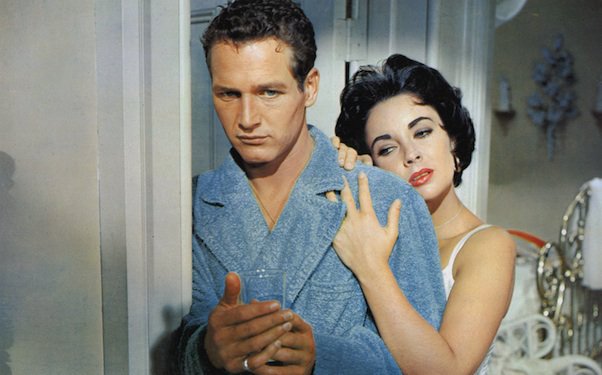
Cat on a Hot Tin Roof (1958)
Hollywood’s best known gay director was George Cukor. He was tolerated because his films made money. But the Academy didn’t seem to approve of him. He was nominated four times before finally winning the Best Director Oscar in 1964. It was a gay British director who was responsible for giving the Academy its biggest shake-up in forty years. In 1966 John Schlesinger had been nominated as Best Director for Darling…, a film about Swinging London in which Roland Curram goes off for a tryst with an Italian waiter. (Homosexuality was still illegal in the UK at the time. But we were a little more liberated about its representation on screen than our American cousins).
Then in 1970 Schlesinger struck back with his first American film, Midnight Cowboy. In the face of the growing “permissive society” the Production Code had been abandoned and accordingly American audiences were now allowed to see a film in which Bob Balaban gives Jon Voight a blow-job in a New York cinema. To the astonishment of many the film was nominated for seven Oscars. It won three of the top ones, Best Picture, Director and Screenplay. Had Academy members thrown in the towel and decided to move with the times? Well, no.
Ever since 1970 it’s been a case of one step forward, two back, where the Academy’s relationship with the LGBT community is concerned. It’s almost as if some of the more senior voters can never quite remember whether or not we’re still illegal. The impression given is that the Academy doesn’t mind a bit of camping about now and again. The campest musical ever made, Cabaret, won eight Oscars in 1973. But it didn’t get the Best Picture award. The original French film of La Cage aux Folles gained three nominations in 1979. Two comedies about transvestism, Tootsie and Victor/Victoria, were nominated in 1982. But that was the year Gandhi cleaned up. The first film about a gay man to win an Oscar was the documentary The Times of Harvey Milk. And that wasn’t until 1984. In 1986 William Hurt became the first man (straight or otherwise) to win an Oscar for playing a gay character for his role as Molina in Kiss of the Spider Woman. As an example of the cultural gulf between theatre and film, Harvey Fierstein’s 1982 play Torch Song Trilogy won many of the top awards both on Broadway and in London’s West End. But the 1988 film version failed to receive a single Oscar nomination.
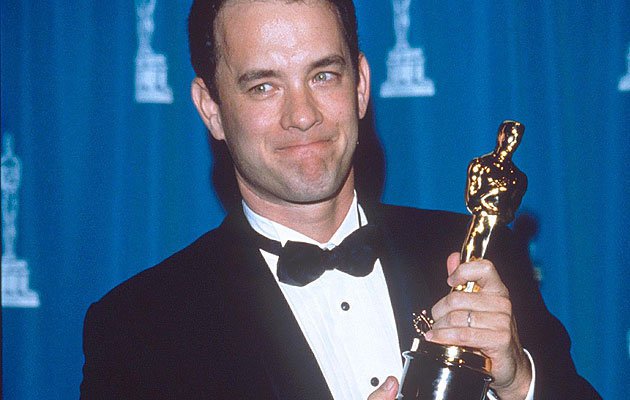
Tom Hanks wins the ‘Best Actor’ Award for his performance in Philadelphia (1993)
Throughout the 1980s the US government appeared to turn a deaf ear to pleas for funds to research a new killer disease. The Academy was similarly indifferent. The first film about AIDS appeared in 1985 but it wasn’t until 1993 that the Academy first accepted nominations for a film about the health crisis. Philadelphia won an Oscar for Tom Hanks, a straight actor playing a gay man, but the film wasn’t nominated as Best Picture. Hanks and Antonio Banderas, playing Hanks’s lover, never kissed. Hollywood clearly thought that such a thing was still unacceptable. Meanwhile studios were continuing to remove references to homosexuality from screenplays. They disappeared from the Oscar nominated Midnight Express (1979) and A Beautiful Mind (2001).
It was Brokeback Mountain that threatened to cause as much upheaval at the 2006 Oscars as Midnight Cowboy had done 36 years earlier. Here was a film about a gay male love affair that received almost unanimous critical acclaim and was shaping up to be one of the most successful romantic dramas ever filmed. The Academy couldn’t ignore it. It won three Oscars including Best Director for Ang Lee. Tellingly, however, it didn’t win Best Picture. And the success of the relatively few films in which minorities get to tell their stories doesn’t seem, as the protests have shown, to have had much impact on Academy policy.
In 2009 there were a couple of Oscars for Milk, the story of America’s great gay martyr. Notably Dustin Lance Black won for Best Original Screenplay. But the film didn’t win Best Picture. Sean Penn, a straight actor, won Best Actor for his lead role. In 2014 there were another couple of statuettes for Dallas Buyers Club, a story about the worst years of AIDS. Again no Best Picture success. This year The Danish Girl, about the world’s first transsexual, is up for four Oscars. Best Picture isn’t one of them.
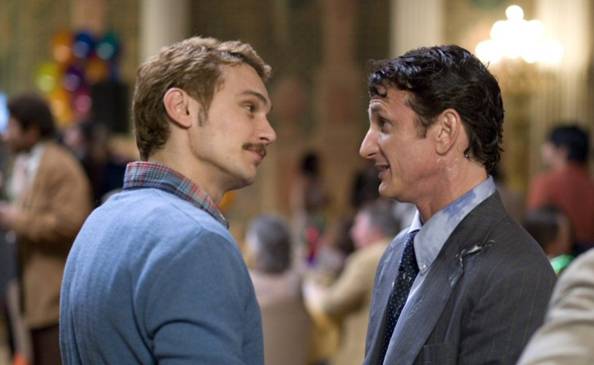
Milk (2008)
Campaigners claim that the Academy ignores countless films that are as good as those that receive nominations. [Indeed this year there was much indignation that Todd Haynes’ Carol received a nomination for its heterosexual lead actress but no other major nominations despite being critically lauded as one of the best films of the year]. Their conclusion is that the rejected films are considered by the aged Academy membership to be “too gay.” Quite possibly the quality of these films is merely a matter of opinion. But overall the homophobia of the Academy of Motion Picture Arts and Sciences is not. While conceding that those behind the trending hashtag #oscarssowhite have “legitimate complaints”, actor Ian McKellen adds, ““It’s not only black people who’ve been disregarded by the film industry, it used to be women, it’s certainly gay people to this day.”
The 88th Academy Awards are held on 28th February.
Words by David McGillivray
More stories:
Screen Actors Guild rewards LGBT performers
Douglas Booth: Saying ‘that’s so gay’ is so damaging
